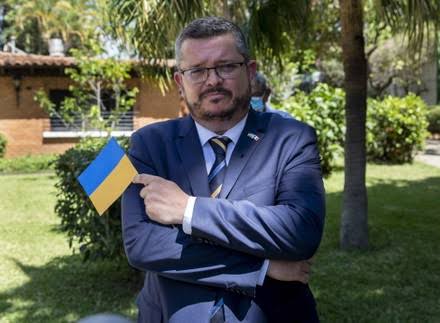Diplomatic Correspondent
Published:2024-11-30 08:53:17 BdST
France seeks BD's partnership in Nutrition for Growth Summit
France has sought Bangladesh’s partnership in the Nutrition for Growth Summit, scheduled to take place in Paris on March 27–28.
“We are grateful that the (interim) government has agreed to join the Summit,” said Ambassador Brieuc Pont, France's special envoy on nutrition and secretary-general of the summit.
“Bangladesh, due to historical reasons, is deeply concerned about issues of hunger and food security. What we expect from Bangladesh is a strong voice advocating for these policies and partnering with us,” Pont said before departing Dhaka on Friday.
During his visit, he extended the formal invitation to the government, engaged in discussions on nutrition with the health adviser, and observed the situation on the ground firsthand.
Previously, Pont served as France's ambassador to Nicaragua and Consul General in São Paulo, Brazil, where he covered the five southern states of the country.
The Nutrition for Growth Summit is a global platform aimed at driving greater action to end malnutrition, ensuring that everyone, everywhere, can reach their full potential.
The UK initiated the summit following the London Olympics in 2012, and subsequent host countries of the Olympics have continued the tradition. Japan hosted the last summit in 2021, during which Tokyo mobilized over $27 billion through 396 commitments from 181 stakeholders across 78 countries.
The upcoming summit in Paris offers a pivotal opportunity to build on the progress made in Japan and advance the Sustainable Development Goals (SDGs) by 2030, Pont emphasized. The year 2025 will also be significant as it marks the conclusion of the UN Decade of Action on Nutrition.
“People often forget that beneath every summit lies a mountain. We are climbing that mountain together, as part of a mountaineer's expedition with Bangladesh and other countries,” Pont remarked when asked about Bangladesh's role.
“The idea is to support one another. If a country has influence over a financial institution, it can encourage them to make a pledge. Similarly, if a country holds sway in a particular forum or group, we ask them to help push the nutrition agenda forward,” he explained.
Pont highlighted the collaborative nature of the initiative, which includes not just governments but also international organizations, NGOs, philanthropies, and other stakeholders working together to develop policies. These policies address critical intersections such as nutrition and gender, nutrition and health, social protection, and resilience in crises.
“It’s about transforming food systems to enable people to thrive in their homelands with sustainable agriculture and decent livelihoods. It also involves technological innovation, artificial intelligence, data collection, finance, and accountability. This comprehensive approach is key,” Pont said.
The summit encourages countries to make pledges that integrate nutrition into their development agendas. For every $1 invested in nutrition, there is a $16 return to the local economy, he noted.
Bangladesh is expected to make significant pledges, including local production of ready-to-use therapeutic food (RUTF)—a life-saving treatment for severe malnutrition in children under five. French pediatric nutritionist André Briend invented RUTF, a therapy made from powdered milk, peanuts, butter, vegetable oil, sugar, and a mix of vitamins and minerals.
“We know Bangladesh is preparing its pledge,” Pont said. For example, at the Global Alliance Against Hunger and Poverty, Bangladesh became a founding member alongside France and announced a $31 million commitment to support maternal nutrition—a critical area for ensuring healthy births.
Bangladesh is also an active member of the UN’s Scaling Up Nutrition (SUN) movement. “Bangladesh has extensive experience to share with others,” Pont noted.
During his visit, Pont traveled to Cox’s Bazar, where he observed two major challenges Bangladesh faces.
The first is the massive refugee crisis caused by the Rohingya influx, a humanitarian situation Bangladesh is managing with international support. The second is the impact of climate change, which is affecting the country's own population.
He commended the efforts of UN organizations in supporting Bangladesh and emphasized the need for community engagement.
While visiting local communities, he spoke with adolescent girls, asking what messages they would like to share with global leaders. Pont underscored the importance of amplifying local voices in global discussions.
Unauthorized use or reproduction of The Finance Today content for commercial purposes is strictly prohibited.


